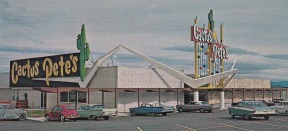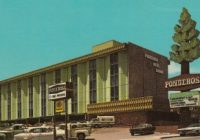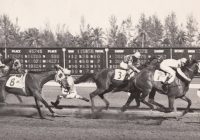|
Listen to this Gambling History blog post here
Getting your Trinity Audio player ready...
|

Cactus Pete’s casino in Jackpot, Nevada in 1960
1960
When one rural Nevada town grew into a gambling hot spot in the mid-1900s, the gamblers in another loudly grumbled.
Soon after Idaho outlawed slot machines, its last vestige of legal gambling, the sagebrush- and broomgrass-covered land 47 miles south of Twin Falls, just across the border, began to evolve into a small community — Jackpot. It grew to consist of about 125 trailers (no houses), two motels, a grocery store and a beauty shop.
Development started in 1954 with the debut of the Horshu Club. The 93, Cactus Pete’s, Tex’s Gateway and Diamond Jim’s then followed. Together, these casinos offered 320 slot machines, four pits of 21, roulette and dice tables, keno and wheels of fortune along with free meals and stage entertainment.
By 1960, the town’s five gambling houses drew thousands of players per year,* many from nearby Idaho Falls. To capitalize on that city’s pool of players, Jackpot’s gamblers provided free nightly, round-trip transportation by bus.
Gamblers Protest About, Well, Other Gamblers
Rival casino owners in Elko, which officially became a city in 1917, claimed the Jackpot clubs were exploiting Twin Falls’ economy. They predicted law enforcement and public service problems would arise in Jackpot and warned the end result would be Twin Falls business owners lobbying for a federal gambling ban.
“Frankly, the Elko gamblers don’t like the competition — they are 115 miles farther from the Idaho line,” wrote the Oakland Tribune (Nov. 13, 1960).
The state’s gaming regulators noted the complaints and thought they might be valid in part. They wondered if casinos in the rural border regions might harm the industry overall, particularly because those places were difficult for them to oversee and because of the payoff scandal involving a gambling watchdog in the rural town of Wells that had occurred earlier in the decade.
The Nevada Gaming Control Board launched an investigation, and in November 1960, conducted a survey of Twin Falls residents about their attitude toward gambling in Jackpot. It revealed that 18 percent favored it, 30 percent opposed it and 53 percent were neutral.
Were Nevada’s gaming agencies to forbid gambling in Jackpot, it would set a dangerous precedent, said the attorney for the community, Leo Puccinelli.
“Nevada gambling was built by competition and it will be in trouble if the established clubs can win monopolies with legislation,” he added. “After all, the major part of Nevada gambling is on a border basis. Only Elko is in central Nevada, while Reno and Lake Tahoe cater to Northern California and Las Vegas to Southern California” (Oakland Tribune, Sept. 16, 1960).
Jackpot’s gamblers remained mum on the issue, hoping it would go away … which eventually it did, leaving them to continue running their casinos without impediment by the state.
*Total gaming revenue from Elko County, including Elko and Jackpot, then was between $4 and $5 million ($32.5 and $40.7 million today) per year.






2 comments